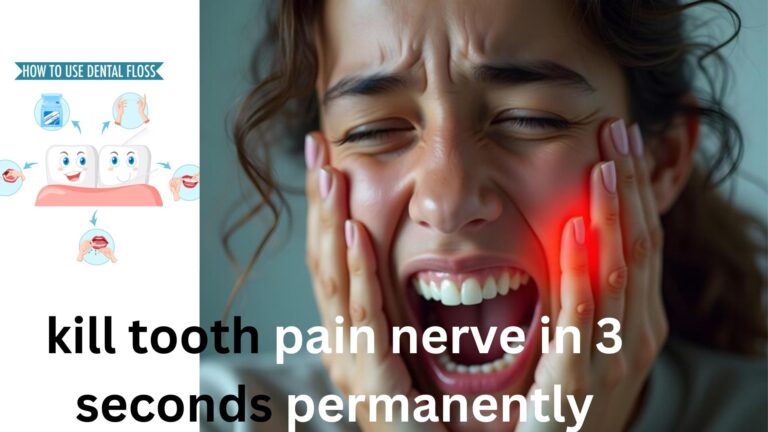Kill Tooth Pain Nerve in 3 Seconds Permanently can be excruciating and disruptive, impacting your daily life and well-being. Understanding how to alleviate this pain quickly and effectively is crucial. This guide explores various methods to address tooth pain and offers insights into both immediate relief and long-term solutions.
Understanding Tooth Pain
Tooth pain is often caused by issues related to the dental nerve, which can result from various conditions:
Tooth Decay: Cavities can expose the nerve, leading to pain.
Gum Disease: Infections and inflammation can affect the nerve.
Dental Trauma: Injuries to the tooth or jaw can damage nerves.
Abscesses: Infections around the tooth root can cause intense pain.
What Is the Tooth Nerve?
The tooth nerve, also known as the dental pulp, is a vital part of the tooth structure. It contains nerves and blood vessels that provide sensation and nourishment. When this nerve becomes irritated or infected, it can cause significant pain.
Immediate Relief Methods
While there’s no guaranteed way to “kill” a tooth pain nerve in just three seconds, several methods can provide quick relief. These methods focus on numbing the pain or reducing inflammation temporarily.
Cold Compress
A cold compress can numb the area around the tooth and reduce swelling.
How to Use
Wrap ice in a cloth or use a cold pack.
Apply it to the affected area for 15-20 minutes.
Repeat every hour as needed.
Over-the-Counter Pain Relievers
Medications like ibuprofen or acetaminophen can offer rapid relief.
How to Use
Follow the dosage instructions on the package.
Do not exceed the recommended amount.
Clove Oil
Clove oil contains eugenol, a natural anesthetic and anti-inflammatory agent.
How to Use
Apply a small amount of clove oil to a cotton ball.
Gently dab it onto the affected tooth.
Saltwater Rinse
A saltwater rinse can help reduce inflammation and cleanse the affected area.
How to Use
Mix 1/2 teaspoon of salt in a glass of warm water.
Swish around your mouth for 30 seconds, then spit out.
Garlic Paste
Garlic has antibacterial properties that can provide temporary pain relief.
How to Use
Crush a garlic clove to make a paste.
Apply it to the painful area for a few minutes.
Long-Term Solutions for Tooth Pain
For lasting relief, addressing the underlying cause of tooth pain is essential. Here are some long-term solutions that may help:
Dental Treatment
A visit to a dentist is crucial for diagnosing and treating the root cause of the pain. Treatments may include:
Fillings: For cavities and decay.
Root Canals: To remove infected nerve tissue.
Crowns: To protect a damaged tooth.
Good Oral Hygiene
Maintaining good oral hygiene can prevent future pain:
Brush Twice Daily: Use fluoride toothpaste.
Floss Daily: To remove food particles and plaque.
Regular Check-ups: Schedule routine dental visits.
Dietary Changes
Avoiding certain foods can reduce tooth pain and sensitivity:
Limit Sugary Foods: These can contribute to decay.
Avoid Extremely Hot or Cold Foods: These can aggravate sensitive nerves.
Home Remedies
Some home remedies can provide ongoing relief:
Turmeric Paste: Turmeric has anti-inflammatory properties.
Peppermint Tea Bags: Peppermint can soothe the affected area.
Conclusion
While it’s unlikely to permanently “kill” a tooth pain nerve in just three seconds, a combination of immediate relief techniques and long-term dental care can significantly alleviate pain. If you experience persistent tooth pain, it is essential to consult a dental professional for a thorough examination and appropriate treatment.
ALSO READ: Trendzguruji.me Health: Your Ultimate Guide to Wellness
FAQs
What should I do if my tooth pain doesn’t go away?
If your tooth pain persists despite using home remedies or over-the-counter medications, it’s crucial to see a dentist. Persistent pain can indicate a serious dental issue that requires professional intervention.
Can clove oil permanently relieve tooth pain?
Clove oil can provide temporary relief by numbing the area and reducing inflammation, but it does not address the underlying cause of the pain. For permanent relief, professional dental treatment is necessary.
Is it safe to use over-the-counter pain relievers for tooth pain?
Yes, over-the-counter pain relievers like ibuprofen and acetaminophen are generally safe when used as directed. However, they should not be used as a substitute for professional dental care.
How can I prevent future tooth pain?
Prevent future tooth pain by practicing good oral hygiene, avoiding sugary foods, and scheduling regular dental check-ups. Addressing any dental issues promptly can also help prevent pain.
Can home remedies replace professional dental treatment?
Home remedies can offer temporary relief but are not a substitute for professional dental treatment. If you have a severe or persistent toothache, it’s essential to seek help from a dentist.

